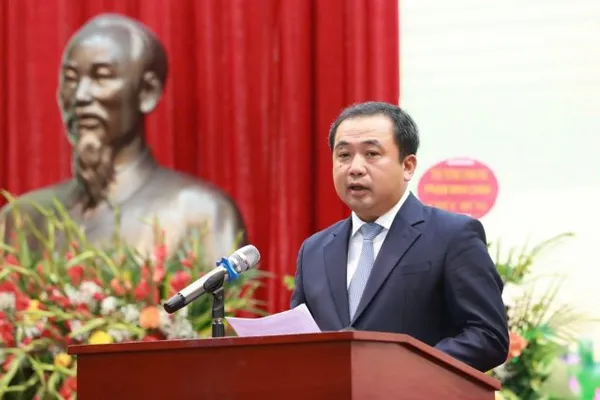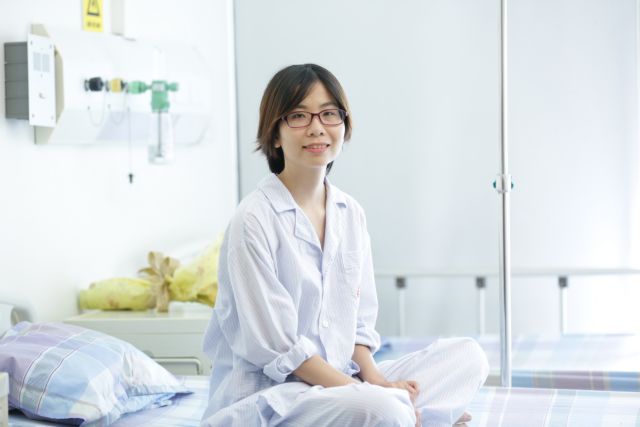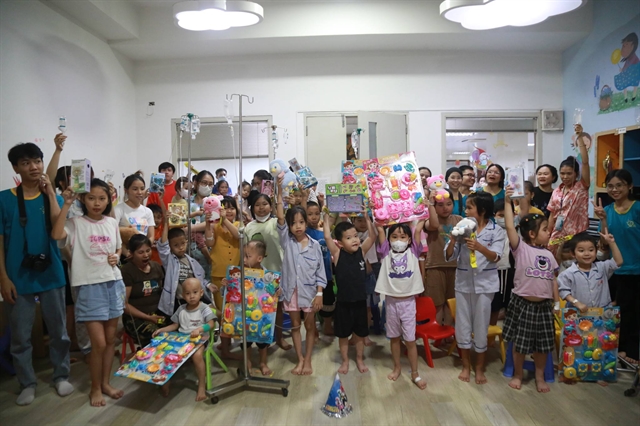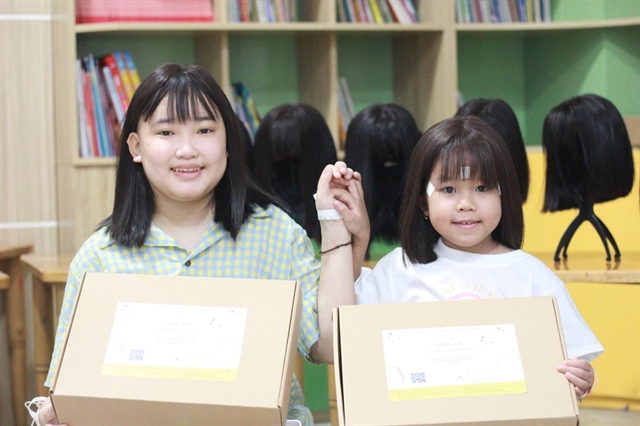 Opinion
Opinion

 |
| Hoàng Thị Diệu Thuần is the founder of Children's Cancer Network, which supports young patients and their families. Photo courtesy of Children's Cancer Network |
Hoàng Thị Diệu Thuần is the founder of Children's Cancer Network, an initiative created in 2021 to support children with cancer and their parents.
It started out as a classroom programme for children with cancer at Hà Nội’s National Institute of Haematology and Blood Transfusion in 2016.
Having suffered from blood cancer herself, she became a volunteer at the institute and helped child patients cope with their illness.
Việt Nam News speaks with Thuần about her experience working with these children and what kind of emotional support they need.
When children are diagnosed with cancer and have to be hospitalised, how are they affected?
When children receive the news that they have cancer, depending on their age and personality, their emotional responses vary. But most kids above the age of six can be aware of their predicament, and are understandably saddened by it.
They may not be fully aware of the gravity of the situation, but understand that their parents are taking them to hospital to do all sorts of tests and that they are not feeling well.
They can lose their appetite, cry a lot when they feel pain or even become angry at caregivers.
They especially become worried and sad when they see their parents worried and sad.
Children who go through cancer treatment can have visible symptoms such as loss of hair, rashes and open sores on their limbs. They become acutely aware that their appearance has changed greatly.
This may not affect them much while in hospital, but after they go home to wait for their next round of treatment, they may meet their old school friends and other family members.
They may not be able to run and play like other kids, or might be shunned by other kids who do not really understand the disease, which can make them feel self-conscious.
 |
| A birthday celebration for children with cancer in Hà Nội’s National Institute of Haematology and Blood Transfusion in June. Photo courtesy of Children's Cancer Network |
What kind of emotional support do they need? What does Children's Cancer Network do to help them?
Unlike adults who can have many things on their mind, children can be simple. They feel hurt and get sad and tired. So they just need mental encouragement, love and care.
They need to be told that doctors and parents are trying their best to help them, so they in turn need to try too, doing little things like finishing their meals, exercising and listening to doctors.
Older children may have a deeper grasp of their condition. They are aware that they might not make it, they have to watch other kids suffer and close friends suddenly dying. These haunting experiences greatly affect their mental strengths.
Many have told me that they get very worried about their friends, and think they themselves can die too.
This is much harder. The best you can do is to be understanding and say nice things or even just hug them in silence. That does help.
Children's Cancer Network has activities to lift their spirits such as classes with fun science subjects, games, light physical activities, and even writing classes for them to express their feelings.
We organise birthday events with gifts every month.
Our Dream Hair Station provides high-quality wigs to help them feel better about their appearance. Many have told me they do not feel confident without hair.
Personally, I usually tell the kids my own story, on how I too used to go through a tough treatment regimen like them, and how I realised that when I get this chance to continue living, I should study hard to not waste this chance.
Many have told me that I have inspired them to study hard despite their condition and pursue their dreams.
How do these kids respond to such activities? What about their parents?
Overall, children respond very well to these activities. Kids just really like toys, gifts and games.
Some children told me that one time they felt very tired after the treatment, but when they heard that a group was visiting, they bounced out of their beds and ran out to greet them!
It is great source of joy for them, something different from all the sickness and medicines.
I think it does help with the treatment, they can become more cooperative with medical staff. They are happier, more chatty and some even say they eat better.
Parents can also be grateful that other people care for them and share their burden. They feel they are not alone.
 |
| Two child cancer patients are happy with their new wigs. According to Hoàng Thị Diệu Thuần, founder of Children's Cancer Network, helping children with cancer be more confident with themselves goes a long way in aiding their treatment. Photo courtesy of Children's Cancer Network |
What should parents or caregivers keep in mind when dealing with children with cancer?
Communication with children with cancer is very important for their emotional well-being. Sometimes they know more than you think, and if parents are not mindful, children might become even more withdrawn and not cooperate for their treatment.
Parents can consult medical staff or social workers on how they should talk to their children about their cancer.
I have seen many cases of parents getting angry with their kids and not knowing how to comfort them.
It is not really my place to tell them off, and I could only say things like "Please be more gentle with them, they are really tired."
If these kids feel loved, they might try harder in their treatment and not give up.
Informing a child that their condition has worsened is much harder to do. But it is still an important thing to do so that they strictly adhere to their treatment and keep fighting.
I know children whose cancer recurred and they told me they wanted to give up because they did not want to be a burden on their parents.
At that time I could only say that I understood their pain and how I went through a similar thing and how they should not think of themselves as a burden.
But this does not work all the time. From my experience older children do not always share their feelings with adults.
How important is community support to keep these children’s spirits high?
This is very important and needs more attention from the community, not just through visits to hospitals to give gifts and play games with children, but also through raising awareness and education.
Teachers and schools should be knowledgeable about cancer to talk to these children, make them feel better and especially help them not feel isolated by friends.
Our activities are not just about helping children with cancer, but also to connect other kids with them, and help them share their love. VNS




